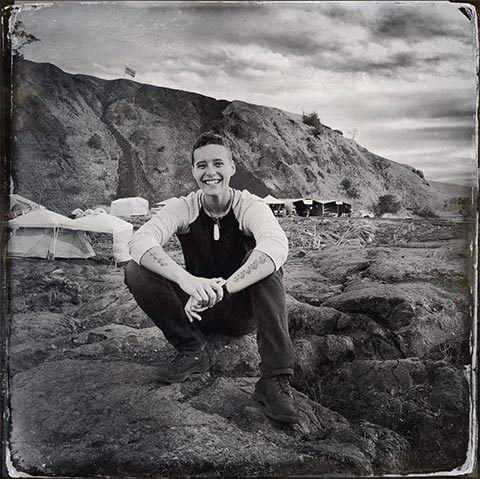
Jamaica Heolomeleikalani Osorio
Associate Professor
Background
Dr. Jamaica Heolimeleikalani Osorio is a Kanaka Maoli wahine mākua / artist / activist / scholar / storyteller born and raised in Pālolo Valley to parents Jonathan and Mary Osorio. Heoli earned her PhD in English (Hawaiian literature) in 2018 from the University of Hawaiʻi at Mānoa. Currently, Jamaica is an Associate Professor of Indigenous and Native Hawaiian Politics at the University of Hawaiʻi at Mānoa.
Heoli is a three-time national poetry champion, poetry mentor and a published author. In 2020 her poetry and activism were the subject of an award-winning film, This is the Way we Rise which premiered at Sundance Film Festival in 2021. In 2022 she was a lead artist and Co-writer of the VR Documentary, On the Morning You Wake (To the end of the world), that premiered at Sundance Film Festival 2022 and won the XR experience Jury award at SXSW 2022.
Heoli is a proud past Kaiāpuni student, Ford Dissertation (2017) and Post Doctoral (2022) Fellow, and a graduate of Kamehameha, Stanford University (BA) and New York University (MA). She is the author of the award winning book Remembering our Intimacies: Moʻolelo, Aloha ʻĀina, and Ea which was published in 2021 by The University of Minnesota Press. She believes in the power of aloha ʻāina and collective action to pursue liberatory, decolonial, and abolitionist futures of abundance.
Research Interests
As a scholar who has the great privilege of spending my life devoted to the knowledges of my people, I am not simply interested in bringing the brilliant ʻike (knowledges) of my kūpuna (ancestors/elders) into the academy for a belated recognition of our intellect and ingenuity. I am invested in pursuing my work and sharing it in a way that will disrupt our institutions and transform our assumptions of what the academy can and should do in order to make way for a more just and ethical society.
My first book, Remembering Our Intimacies, centered on the personal and embodied articulations of aloha ʻâina to detangle it from the effects of colonialism and occupation. Working at the intersections of Hawaiian knowledge, Indigenous queer theory, and Indigenous feminisms, I sought to recuperate Native Hawaiian concepts and ethics around relationality, desire, and belonging grounded in the land, memory, and the body of Native Hawai’i.
My current research has shifted to trace the institutionalization of carceral systems in the Hawaiian Kingdom and Hawaiian territorial history. I trace these transformations into the contemporary period while investigating intergenerational resistance to carceral politics. This research follows resurgence of Puʻuhonua in contemporary Hawaiian movements as a culturally grounded and contemporarily relevant alternative to policing, prisons, and other carceral institutions of state violence. I pursue this work as both a scholar and kiaʻi to support collective action to pursue liberatory, decolonial, and abolitionist futures of abundance.
Teaching Philosophy
I practice an aloha ʻāina pedagogy in the classroom. The following are some of the central elements to this teaching philosophy:
- The Academy is a Violent Institution. Academic institutions, including our own University of Hawaiʻi, have been sites of epistemological and material violence towards Native peoples and our ʻāina. My pedagogical approaches in the classroom must first address this historical and ongoing violence by refusing to uphold the status quo of the university environment.
- Creativity is Critical. divisions between the critical and the creative disciplines and mediums are politically and socially constructed. Grounded scholarship requires rigorous creativity; therefore, in my classes, students are pushed to think, write, and engage with each other in new and creative ways while crafting their rhetorical and argumentative writing skills.
- Aʻo Aku/ Aʻo Mai. Learning is a reciprocal process. This reciprocity requires co-creation and for students and educators to develop a strong ethic of care and trust in order to endeavor to learn beside each other. I do not enter my classroom as an expert, or as the gatekeeper of knowledge. Instead, I facilitate learning communities by using my training to present students with a diversity of challenging ideas and materials.
- Education is political. I assist students in making meaningful connections between our subject matter and how they are personally implicated and affected in the content we study. Most of my pedagogical approaches can be described by the brilliant words of Haunani-Kay Trask, who said the purpose of education is to “put students in a contradictory relationship with the powers that be.” In addition to doing that painful and difficult work I am equally committed to supporting students in developing the dexterous skills necessary to respond to those contradictions in a way that is productive and meaningful in their work and lives, in service of a more ethical university and world.
Courses Taught
- POLS 140 Introduction to Indigenous Politics
- POLS 180 Introduction to Hawaiʻi Politics
- POLS 301 Hawaiʻi Politics
- POLS 302 Native Hawaiian Politics
- POLS 304 Indigenous Politics
- POLS 620 Intro to Indigenous Politics
- POLS 621 Politics of Indigenous Representation
- POLS 684 Contemporary Native Hawaiian Politics
- POLS 777 Decolonial Futures